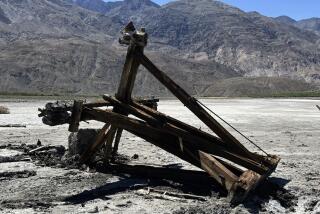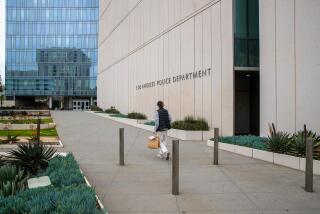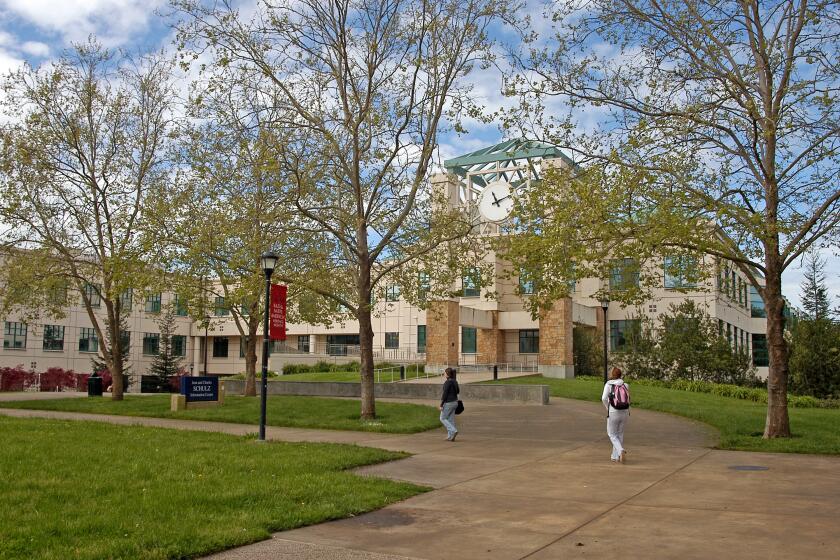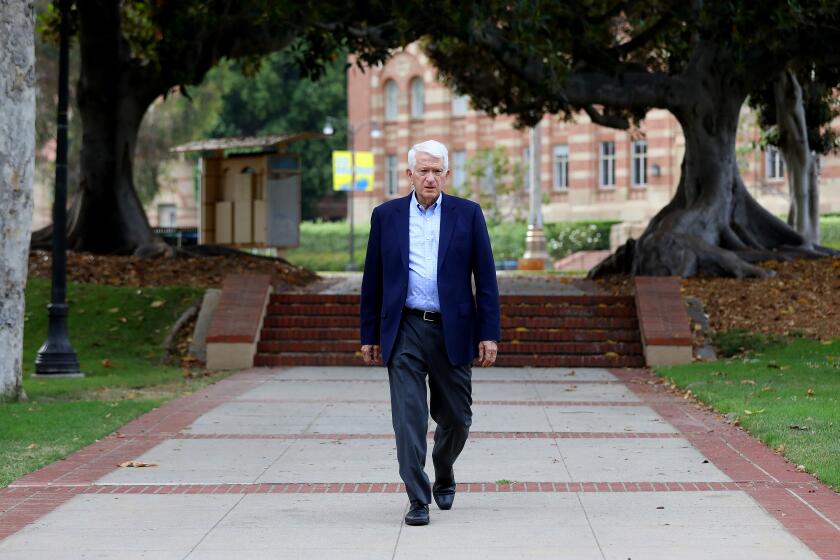A Political Assault on Academic Values : UCLA: The demand for a Chicano studies department was an unnecessary distortion of the university’s purpose.
This year’s political correctness award seemed destined to go to the University of Pennsylvania for the “water buffalo” controversy. But a new entry has taken the lead: the Chicano protest at UCLA.
For 13 days, nine protesters, including an assistant professor of biology in the Medical School, staged a hunger strike in support of demands for a Chicano studies department. The existing Chicano Studies Center, with a budget of $272,000 and 18 courses provided by faculty members from a variety of departments, didn’t satisfy the protesters. They demanded a full-blown department with its own faculty of at least 15 professors and a budget of $2 million to accommodate 50 Chicano studies majors on a campus of nearly 24,000 undergraduates. They also called for student participation in faculty hiring, a sure-fire prescription for undermining UCLA’s national reputation as an institution with a commitment to upholding serious academic standards.
All this comes at a time when the university, in response to severe funding cuts, may eliminate undergraduate nursing studies and the graduate program in library and information sciences.
Most people outside the university are hard put to understand the difference between a center and a department and were mystified by the willingness of nine people to jeopardize their health and the tranquillity of the university for what seems more like a bureaucratic nicety than a truly noble goal. The protesters argue that much more is at stake here than the distinction between a center and an academic department. The issue is respect and regard for an oppressed minority that now makes up 40% of the Los Angeles population.
The university was put in an impossible position; it negotiated with a gun to itshead. Chancellor Charles E. Young was asked if he felt beaten up by elected officials who were pressuring him to give in to the protesters’ demands. “You bet,” he replied. “I’m sitting in there with people who have power over me and are threatening to use it.”
Legislators supportive of the protesters proposed holding part of UCLA’s budget hostage until the chancellor met their demand. This was a throwback to a time when people more interested in advancing an agenda than serving some legitimate academic end tried to impose their political ideas on the country’s universities.
The compromise reached on Monday happily ends the threat to the protesters’ health. But it diminishes UCLA’s integrity, inflames social tensions and contributes to what historian Arthur Schlesinger Jr. has aptly described as “the disuniting of America.”
Despite the compromise, UC will continue to be pressured to set up Chicano and possibly other ethnic studies departments. Doing so would be an assault on traditional academic standards that have served universities for decades.
University departments are not created to satisfy political demands or for some therapeutic purpose. They are organized around disciplines that rest on knowledge and understanding developed over long periods of time. UCLA, for example, has a nationally recognized communications studies center with 300 majors, but it is not a department because communications studies still lacks the body of critical scholarship essential to an academic discipline.
Those faculty members who are offended by the protesters’ indifference to the university’s academic heritage are also troubled by their distorted sense of proportion. UCLA’s reluctance to “give in” is glibly described as “racism” or indifference to the needs of an abused minority. If this were 40 or 50 years ago, when the chances for minorities and women to gain access to higher education, first as students and then as faculty members, was so much less available, the complaint would be more understandable. But in recent years, the doors of opportunity have been flung open to everyone, regardless of race or gender. One has the feeling that the protesters are locked in a time warp without the benefit of recent history to guide them.
As much to the point, the protesters would do well to consider the ways in which other minorities gained access to the regard and influence they now hold in America. The Irish in Boston, for example, even though they were a despised minority, did not seek consolation in Irish studies. Those who were fortunate enough to have the opportunity of higher education seized it and made their way in an American society that is ever receptive to talented and ambitious people.
No one who knows anything about America’s history is unmindful of the prejudice and hatred that minorities have struggled to overcome. But the answer to racism, ethnic bias and gender discrimination is not a like response. Nor will an accommodation to the society in which they live deprive Chicanos or any other minority of the possibility to take pride in their special identity as Americans with a distinctive background.
The well-being of the country, a nation of almost countless minorities, will continue to depend on every group’s ability to enjoy a shared pride in both its own and America’s special virtues.
More to Read
Start your day right
Sign up for Essential California for news, features and recommendations from the L.A. Times and beyond in your inbox six days a week.
You may occasionally receive promotional content from the Los Angeles Times.






